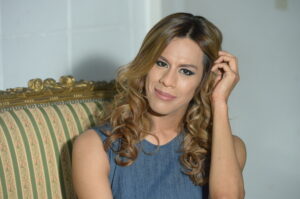In March, Diana Zurco, 41, became the first trans woman to present a newscast on Argentine TV, a milestone that has been recorded in several reports across Latin America, the United States and Europe.
Zurco and two other journalists present the main edition of Televisión Pública Noticias, at 8 p.m., the most important newscast on public TV in Argentina. She still has her other job as an announcer at Radio Ciudad AM 1110 in Buenos Aires, in addition to being constantly called for interviews, lectures at schools and events. In other words, her agenda is very busy.

Diana Zurco, en la TV Pública. Foto: Nadia Ingaramo/Tv Publica
The LatAm Journalism Review caught up with Zurco to find out how the public has reacted to her start, the evolution of her work and her relationship with colleagues.
The interview took place on Oct. 12, over the phone, and started with her apologizing for the delay. It was her birthday. "Here I am receiving a lot of great well-wishes, my WhatsApp exploded,” she said. Soon afterwards, she said how sad she was that she could not embrace her mother, with whom she lives, because of the pandemic – “I felt a shock to my body, emotion. It seems like a detail, but it isn’t. That situation of not being able to hug your loved ones hurts you.”
So, right away, Zurco opened up and recounted one story after the other, going through the most varied themes, from childhood to her current work, with fluidity and sympathy. Sometimes she apologized for speaking a lot and justified that her speech was not fake, but "felt," something "vivid, that comes from the heart," and continued with new reasoning, strong defenses of human rights and moving stories.
Zurco talked about the satisfaction of breaking barriers and being the first trans woman in her role, but also about the pressure and demands. "So sometimes I feel a magnifying glass on me at the social and professional level, because there is still the prejudice of whether I am capable of fulfilling the role I have, just because I am trans," she said. Read the principle excerpts of the interview below, which was edited for clarity and size.
LatAm Journalism Review: It's been about seven months since you started presenting the newscast on television. How has that changed your professional life?
Diana Zurco: It is something unprecedented. I am a professional who started in radio and previously went to the academy, to ISER (Instituto Superior de Enseñanza Radiophónica). And the name of the specialization is radio and television announcer. So I prepared myself to assume different roles ... But preparation and everything you learn in the academy is not the same as practicing the trade. That's why I began on television this year, in March, and it was a new scenario for me because I had never done television at a professional level. A whole discovery began for me, to be able to face a camera. Especially in a very important newscast such as Televisión Pública, which goes out to the whole country, and also as the host of the central newscast, the most important edition of the day. It was like ... a lot of everything, all at once, you understand?
And to that must be added what my arrival to that role as a trans woman would mean. Because it shouldn't be news, I always say it, that a trans person fills a work role, but it is necessary, I always say that, too, that today it is news, so that tomorrow it will no longer be news. So that trans people are naturalized anywhere. That is why it is important to be aware of the processes. As a trans person, I am aware that I am part of a process of assimilation of a society that began to be open-minded, such as our Argentine society, through the laws. Why do I make that differentiation for you? Because written laws are one thing, but there are also unwritten laws, the social prejudice of people who still do not assimilate that open-minded look. The changes are taking place gradually, not suddenly, but those first steps are important.
LJR: And how did all that affect your experience?
DZ: I experienced it from a place with a lot of expectation and with a lot of social demand, because before I debuted on the news program, the news was already leaked. And the calls began from all sides, it was a media explosion that made me feel pressured. I was bombarded with many demands, and it did not allow me to really enjoy the moment, I began to act on automatic. I really experienced it in a very intense way and only recently began to enjoy it.
LJR: In a context of a lot of violence against trans people in Latin American countries, and taking into account the issue of representation in the media, which are often not very diverse, what is, for you, the importance of assuming this role that’s so visible, in one of the most important news programs in Argentina?
DZ: I think media are taking notice of social changes. In many countries around the world, especially in Latin America, I have the feeling that debates and issues that society has generally always put off are beginning to come to the table. [...]
My story and everything I’m doing does not reflect the reality of 100% of trans people in Argentina, because most trans people in my country do not have access to formal work, they are kicked out of their homes at an early age by their families, especially in the smallest towns, are on the streets, and the first to appear as an option is prostitution, because there is no other place where they are accepted. That is why my participation is important, my role at this time, because it marks a milestone, because a stigma was broken.
Many people write to me, it is very gratifying to receive messages from fathers and mothers who tell me: 'Diana, I think my child is trans, and today I dream of a better future for them when I see you, because I know that the future is not going to be prostitution, marginalization.' Somehow, a stereotype was broken, also in the media, with my role as a newscaster, because the trans person is no longer in a humorous role, to make people laugh. Historically, the trans person has always been seen from the pejorative place, to make comedic programs...
LJR: Or to do celebrity shows, for more frivolous things ...
DZ: Yes, more, frivolous. From one point, our word was cut off, or only identified with a place of minor, superficial importance. And I am convinced that it does not have to be that way, because we are thinking and capable beings like anyone else. For this reason, I am glad that there is an opening in Televisión Pública Argentina and thanks to this opportunity we can change the course of some thoughts. And that has to do, without a doubt, with collective work. The work of LGBTQI+ activism in our country, that of militancy, it has gotten us here today, where we are. I always speak of a collective struggle and an individual struggle of trans people. I am, in part, a member of a collective and, to fight for our rights, we feel united. But I also know that I have an individual path, that is, if I am not responsible for my functions, no one is going to do it for me, do you understand?
There is structured work in these advances. Because if I had not been offered the opportunity and the doors of Televisión Pública opened, today I would not be in this role either, which is why I am very grateful for the decision, even political, especially at the government level, of a new inclusive look. I thank you very much, and please put it, Rosario Lufrano, president of Radio y Televisión Argentina, along with Eliseo Álvarez, director of Televisión Pública Argentina, because they have given me the opportunity to make myself visible and make visible a concept, which is that of trans people through me, and also to demonstrate my professional ability.
That is very important. Because my professional path is what sustains me today so that many people are not left with the prejudice that trans people only access a place for a matter of inclusion policy, but also because we are capable. So sometimes I feel a magnifying glass on me on a social and professional level, because there is still the prejudice of whether I am capable of fulfilling the role I have, just because I am trans.
LJR: It’s a great pressure.
DZ: Yes, there is pressure. It should not be like that. But, well, that’s part of that whole journey, it’s not out of the blue, either. It is because we are breaking stereotypes and cultural structures.
LJR: You talked about the beautiful messages you received from fathers and mothers, but have you also faced prejudice from the public or have you been through a difficult situation?

Diana Zurco, en la TV Pública. Foto: Nadia Ingaramo/Tv Publica
DZ: Let's see, yes, there are opinions of all kinds, it’s logical that this is the case. But when they publish a news article about me, I don't usually read the comments, because I know that there are negative or offensive expressions, and it seems to me that there is no point wasting my time on that. [...] I don't see anything productive in me returning a grievance, that's why I don't argue. It is also part of my character, I am a person in favor of consensus, of dialogue. When these instances of dialogue and listening are created, it is absolutely productive for our society. When that doesn't happen, and from the other side there are offenses, there is no possible dialogue. So what can I do? Trying to bring my expression and person through my work, my professionalism and words, because that is my fundamental tool, communication. [...] There are negative views, of course there are, Argentina has a very strong conservative side as well. [...] But I try not to get hooked [on offenses], not to take it in so that it doesn't harm me. As I told you at the beginning, I am aware that there are changes that are gradual and there are people who will take time. I am absolutely convinced that there are changes that I am not even going to see. I am going to leave this world and I will not see all the changes that I dream of from my idealistic mind.
LJR: It must be a thing of pride to be the first trans person to host such an important newscast, but at the same time it must be difficult to be one of the only trans people in the work environment ...
DZ: It is.
LJR: ... How has the relationship with colleagues been in those months?
DZ: It's a day-to-day learning. Because there is a lot of machismo within the media, and older people. One notices that. There are a lot of factors, not only the macho viewpoint, because the media, as can happen in other areas, are also loaded with jealousy, egos, competition, so factors are added. [...] I also have to emphasize that there are people very eager to understand, to learn, and I feel respected. In addition, it has to do with my personality, I am very given to people, I am a good work colleague, so luckily I receive that response on Televisión Pública. But that does not mean that there aren’t some prejudiced views. They struggle or they are learning, because I am something unprecedented, something new, my arrival as a trans person, let's say. Fortunately, I have respect, and I think I also earned that.
LJR: Do you think that being trans is going to bring more diversity to the newscast?
DZ: Yes, that happens, that is important. My presence also questions the content and the gender perspective is being taken into account, and it is extremely important that media do so. Televisión Pública is taking part in that. In the newscast that we do, where I am one of the hosts, we also take on certain topics that were not previously covered in a newscast.
This year, for the first time, a trans person was able to interview the President of the Nation [Alberto Fernández], and that was me. That was also historic. After my question, the evictions that were taking place with trans people in the middle of the pandemic could be stopped. The nation's president issued a decree prohibiting evictions and rent increases at that important time. Information came to me, from different sources, that they were evicting trans people and were throwing them out on the street, because they could not pay the pension or the hotel. Look how content could be incorporated from my presence, a question could be asked and, at that moment, the country's president made a decision. And the next day, from our newscast, we sent cronistas to cover that place where they were about to evict trans people. That was a milestone for me and for my trans community.
LJR: And do you think your question contributed to the president's decision?
DZ: Yes, absolutely. And the trans community then made me realize how important it was for them that I asked that question. But at that moment I was not aware, I did it in a natural way. I don't think I could not ask that. I felt that I had the commitment to do it, because I also represent a group, although I did not seek it. Without realizing it, I became a symbol, a reference. That is why it is important that I take it with humility, with commitment, and I do not forget that today I may have a privileged place, unlike most trans people. I would like them to take it as an example in other countries, so that we can have a voice and a presence.
LJR: And that privilege is important to take advantage of, as you did, to use that space ...
DZ: Use it and also, from my place, to not lose sight of the fact that I speak to the whole of society, not only can I ask about trans or LGTBIQ + people, I can present other types of content that do not have to do with the gender perspective, with sexual identity or diversity. That is the true inclusion, that they do not cut us off or think of us as a representation of only one issue. This is the important thing about what happens in our newscast: because I am trans, I don't have to only talk about trans issues. There is the real practice of integration.

Diana Zurco, en el estúdio. Foto: Nadia Ingaramo/Tv Publica
LJR: This is a highly visible position, people now recognize you on the street, how is that?
DZ: As we are in a pandemic, I wear glasses and a mask, so when I walk down the street, no [laughs]. What has happened to me is that I usually catch a train to go to work, because I live far away, [...] and some street vendors recognize me on the train. They have asked me: "Are you the girl on television?", "Are you the journalist from TV Pública?" Those things happen. [...] There is a word that is repeated a lot, and it touches me, because I want to be humble on my way, I don't want to be arrogant, but they tell me that I am an example, that I am a source of pride, they are very strong words…
I'm going to tell you a little anecdote, but a very important one. I am also a lecturer, I started giving talks a few years ago because I was the first trans female broadcaster in the country. They began to invite me to give talks for schools, for days about vocations, gender violence, bullying. [...] Once a boy wrote to me who was about to finish high school. He had no concerns about his gender identity or his sexual orientation. What happened to him was that he wanted to leave school because he was hopeless about the future and the country.
He heard me talk about my effort, my sacrifice, to be able to make a career and he told me: "You caused something in my mind to click, and now you made me want to finish school and study a career, because if you could, I can.” You see? That was very strong, it continues to fill me with emotion. This goes beyond the question of gender and diversity. Of course, if I could, having an adverse path, because it is more difficult to face the world being trans, why couldn't he have a career, be someone? You understand? I carry that with me, the messages of mothers, fathers, boys and girls. I feel that from where I am speaking it reaches the boys and girls from all over the country, who today may be thinking that they have a future that is not going to be the street. I am not forgetting that, it is a very strong engine for me.
This interview was originally written in Spanish and was translated by Teresa Mioli.